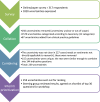Setting research priorities for patients on or nearing dialysis
- PMID: 24832095
- PMCID: PMC4186509
- DOI: 10.2215/CJN.01610214
Setting research priorities for patients on or nearing dialysis
Abstract
With increasing emphasis among health care providers and funders on patient-centered care, it follows that patients and their caregivers should be included when priorities for research are being established. This study sought to identify the most important unanswered questions about the management of kidney failure from the perspective of adult patients on or nearing dialysis, their caregivers, and the health care professionals who care for these patients. Research uncertainties were identified through a national Canadian survey of adult patients on or nearing dialysis, their caregivers, and health care professionals. Uncertainties were refined by a steering committee that included patients, caregivers, researchers, and clinicians to assemble a short-list of the top 30 uncertainties. Thirty-four people (11 patients; five caregivers; eight physicians; six nurses; and one social worker, pharmacist, physiotherapist, and dietitian each) from across Canada subsequently participated in a workshop to determine the top 10 research questions. In total, 1570 usable research uncertainties were received from 317 respondents to the survey. Among these, 259 unique uncertainties were identified; after ranking, these were reduced to a short-list of 30 uncertainties. During the in-person workshop, the top 10 research uncertainties were identified, which included questions about enhanced communication among patients and providers, dialysis modality options, itching, access to kidney transplantation, heart health, dietary restrictions, depression, and vascular access. These can be used alongside the results of other research priority-setting exercises to guide researchers in designing future studies and inform health care funders.
Keywords: Dialysis; patient preferences; research priorities.
Copyright © 2014 by the American Society of Nephrology.
Figures
References
-
- Canada's Strategy for Patient-Oriented Research: Improving health outcomes through evidence-informed care. 2013. Available at: at http://www.cihr-irsc.gc.ca/e/44000.html Accessed September 27, 2013
-
- Institue of Medicine: Crossing the Quality Chasm: A New Health System for the 21st Century. Washington, DC, National Academy Press, 2001 - PubMed
-
- Liem YS, Bosch JL, Hunink MG: Preference-based quality of life of patients on renal replacement therapy: A systematic review and meta-analysis. Value Health 11: 733–741, 2008 - PubMed
Publication types
MeSH terms
Grants and funding
LinkOut - more resources
Full Text Sources
Other Literature Sources
Medical


